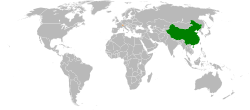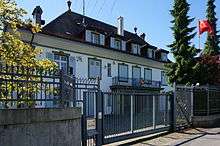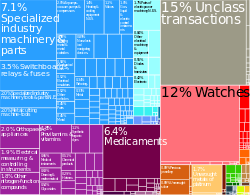China–Switzerland relations
China–Switzerland relations officially began in the early 1950s.[1]
 | |
China |
Switzerland |
|---|---|
History
Diplomatic relations between Switzerland and the People's Republic of China (proclaimed on 1 October 1949) were established on 17 January 1950.[1][2]
Switzerland's economic relationship with China goes back to the late 18th century when colonial powers held foreign concessions in China, and Swiss traders benefited from consular protection, unequal contracts and extraterritoriality rights.[3] After the Chinese revolutions (Boxer Rebellion and Xinhai Revolution) in the early 20th century, Sino-Swiss economic relations were heavily compromised by the Japanese hegemony in mainland China, and Switzerland's proximity to European colonial powers. It was not until the end of World War II, when Switzerland along with other European countries abandoned colonial trade and moved from trading textiles and food to watches and machinery.[3]
Bilateral relations

Sino-Swiss economic relations have accelerated since Deng Xiaoping's economic reforms in the late 1970s.[3] Switzerland's trade with China is not in deficit as other industrialized nations trade with China. Two way trade between the two countries is growing at an annual rate of 20–30 percent.[4] In 2007, Swiss exports were valued at 5.4 billion Swiss francs or 5.36 billion US dollars.[4] China is now Switzerland's top trading partner in Asia, ahead of Japan.[4]
Swiss firms have been investing in China substantially over the last decade. There are approximately 300 Swiss firms with more than 700 branches operating in China with a total employment of 55,000 people.[3] Chinese firms have a small but growing presence in Switzerland as a base to expand in Europe.[4] Chinese firms are not only entering markets for basic consumer goods such as textiles and shoes but also for chemical intermediates, pharmaceuticals, high technology parts, and telecommunications.[4]
In May 2013, during his official visit to the alpine nation, Chinese Premier Li Keqiang signed the first free trade agreement between the two countries worth more than 26 billion. Direct exports from Switzerland to China account for 22.8 billion in that deal, which was heralded as a "real milestone" by then Swiss President Ueli Maurer. Switzerland has a positive trade balance with China, and both countries are expected to profit from export guarantees, protection of intellectual property and financial cooperations between their largest banks.[5] Switzerland thus became the first continental European country[6] and the largest economy to conclude a free trade deal with China.[7][8]
In January 2015, during the World Economic Forum, the Swiss National Bank and the People's Bank of China signed a memorandum of understanding on the establishment of renminbi clearing arrangements in Switzerland.[9]
In July 2019, British UN Ambassador Karen Pierce delivered a joint international statement on Xinjiang at the United Nations General Assembly's Third Committee on behalf of 23 countries, including Switzerland. The countries said they shared concerns raised by the United Nations International Convention on the Elimination of All Forms of Racial Discrimination regarding “credible reports of mass detention; efforts to restrict cultural and religious practices; mass surveillance disproportionately targeting ethnic Uyghurs; and other human rights violations and abuses.” They called on China to comply with its national and international obligations to respect human rights, including freedom of religion, and allow UN human rights monitors access to detention centers.[10]
In June 2020, Switzerland openly opposed the Hong Kong national security law[11]
Economic ties
 Chinese exports to Switzerland
Chinese exports to Switzerland Swiss exports to China
Swiss exports to China
References
- Bilateral relations Switzerland–China, Swiss Federal Department of Foreign Affairs (page visited on 25 January 2015).
- Official diplomatic telegram on 17 January 1950 from President of the Swiss Confederation, Max Petitpierre, to Mao Zedong in the Dodis database of the Diplomatic Documents of Switzerland
- http://www.chinaweb.de/china_politik/china_schweiz/beziehungen_wirtschaft_china_schweiz.htm#2_Sino-Swiss_economic_relations_in_a_historical_perspective
- Two-way trade blossoms with China
- Swiss free trade deal underscores China's globalisation: Li Archived 16 February 2015 at the Wayback Machine haveeruonline (retrieved 26 May 2013).
- First European country after Iceland according to "Archived copy". Archived from the original on 5 April 2016. Retrieved 25 January 2015.CS1 maint: archived copy as title (link) (page visited on 25 January 2015).
- China seals first free-trade deal with Switzerland, BBC News, 24 May 2013 (page visited on 25 January 2015).
- Marc Lanteigne, "The Sino-Swiss Free Trade Agreement", Center for Security Studies (CSS) of the Swiss Federal Institute of Technology in Zurich, 24 May 2013 (page visited on 25 January 2015).
- "Fresh progress in China-Switzerland financial cooperation", press release of the Swiss National Bank, 21 January 2015 (page visited on 24 January 2015).
- Charbonneau, Louis (30 October 2019). %5b%5bHuman Rights Watch%5d%5d "Countries Blast China at UN Over Xinjiang Abuses" Check
|url=value (help). Retrieved 3 July 2020. - Lawler, Dave (2 July 2020). "The 53 countries supporting China's crackdown on Hong Kong". Axios. Retrieved 3 July 2020.
External links
- (in English) Bilateral relations Switzerland–China (Swiss administration)
- (in English) Embassy of Switzerland in China
- (in German) Embassy of China in Switzerland
.svg.png)
